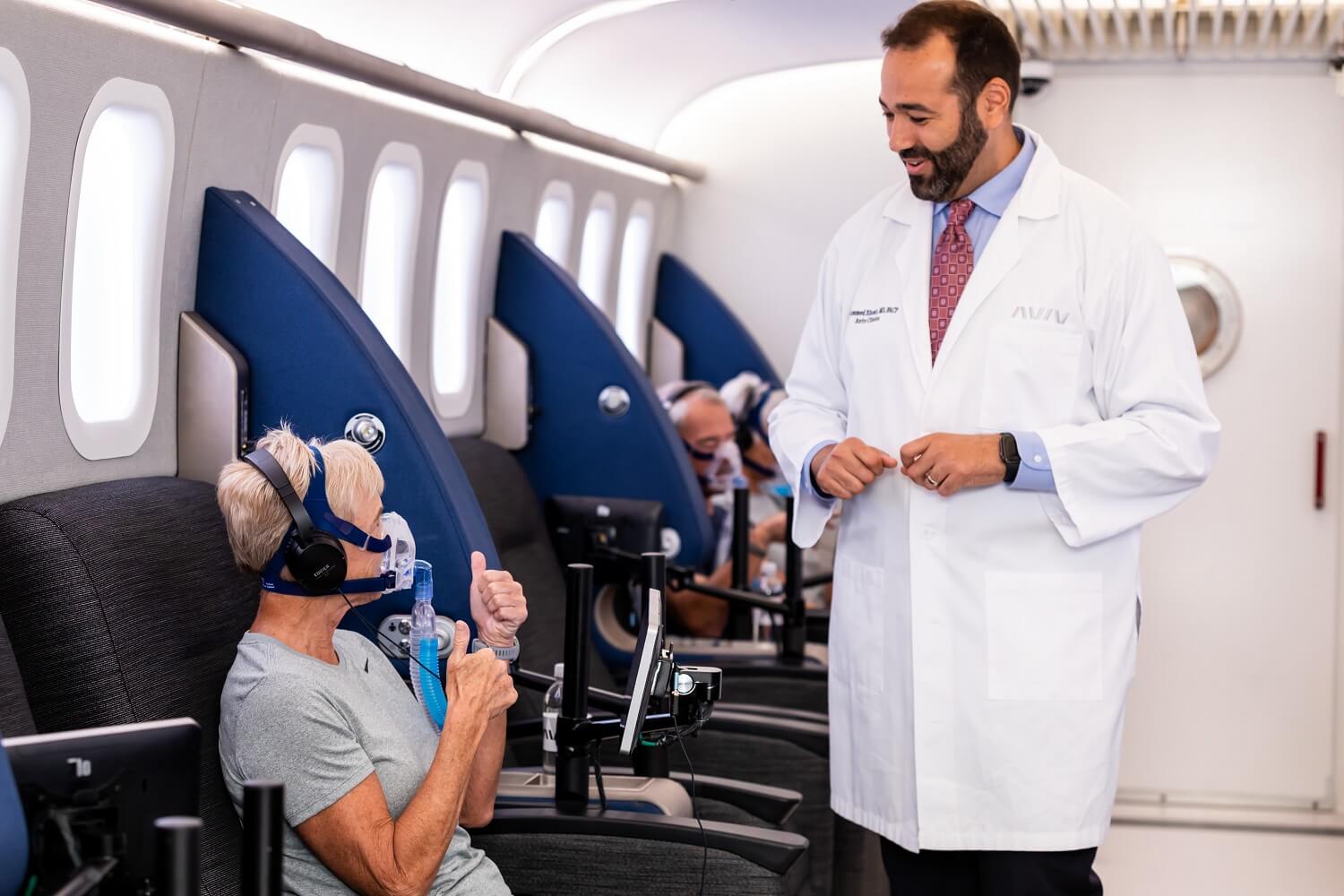Are You Suffering from Chronic Lyme Disease Symptoms?

Managing chronic Lyme disease is a battle against invisible symptoms that may be difficult for those around you to understand. The experience can be frustrating and confusing—but you’re not alone. Those who grapple with the lasting symptoms of chronic Lyme disease, also called post-treatment Lyme disease syndrome, often face:
- Persistent fatigue
- Joint pain and inflammation
- Brain fog
- Mood changes
- Sleep disturbances
- Numbness or tingling sensations
- Dizziness
- And many others
Aviv Clinics offers advanced chronic Lyme disease treatment for persistent symptoms at our UHMS-accredited health care facility. Don’t let the symptoms of chronic Lyme disease control your life. Our innovative approach may provide relief and recovery.

-
What Is Chronic Lyme Disease?
Chronic Lyme disease, or post-treatment Lyme disease syndrome, is a common bacterial infection that spreads to humans via infected ticks. Some experts believe the bacteria can trigger an autoimmune response, causing symptoms that last well after the infection itself is gone.
As many as 476,000 people may contract Lyme disease each year in the U.S. alone, according to the Centers for Disease Control and Prevention.
Lyme disease is difficult to treat, leaving many patients with chronic symptoms despite standard antibiotic treatments. Lyme disease in its chronic state can lead to symptoms that are often overlooked or misdiagnosed, including fever, rash, facial paralysis, arthritis, mental fog, fatigue, and sleeplessness.
Research has found that hyperbaric oxygen therapy and other interventions used in the Aviv Medical Program can provide effective chronic Lyme disease treatment.
-
Assessing Damage Caused by Lyme Disease
Chronic Lyme disease affects each individual uniquely, leaving a complex trail of health challenges. Aviv Clinics recognizes that fully understanding your situation is the first step toward successful treatment for chronic Lyme disease.
During your Aviv Clinics assessment, our clinical team employs state-of-the-art diagnostic tools to evaluate the scope of the disease’s impact. Assessments such as cognitive tests may reveal Lyme disease’s effects on your brain function, while bloodwork can help identify key indicators of your body’s battle with Lyme disease.
This assessment forms the foundation of your personalized chronic Lyme treatment plan. Our healthcare team targets our approach to address the root causes of your specific symptoms and concerns.
At your request, we can conduct an additional post-treatment assessment to measure your recovery progress and identify opportunities for further improvement.
-
The Aviv Medical Program Approach to Chronic Lyme Disease Treatment
Patients with chronic Lyme are discovering hope and relief at Aviv Clinics. The science-backed Aviv Medical Program offers comprehensive chronic Lyme disease treatment for patients who have not responded to antibiotic treatment.
Our customized program can combine multiple evidence-based therapies. Your Aviv Clinics physician may prescribe cognitive and physical training, dietary coaching, a specialized hyperbaric oxygen therapy, and/or other interventions. Each program is designed to address our clients’ unique challenges, symptoms of chronic Lyme, and the underlying factors that contribute to the disease.
This integrated approach is designed to maximize the body’s healing process and reduce symptoms of mental fogginess, fatigue, sleeplessness, and joint pain. Patients can experience significant improvements long after treatment ends.
Contact Aviv Clinics to see how we can help you reclaim your life.
Healing from Chronic Lyme Disease - Watch Lyndi's Story
Benefits of Aviv Medical Program may include*:
Benefits for your body:
- Reduced joint pain (strong anti-inflammatory effect)
- Less fatigue and better sleep
- Increased energy, power and stamina
- Better physical performance: fitness, strength, coordination, balance
Benefits for your brain*:
- Better brain connectivity and function (the general health of your brain and how it controls thoughts and feelings)
- Stronger mental abilities, including memory, attention, and focus
- Faster information processing speed (how quickly you complete mental tasks)
- Sharper executive functions (the set of complex mental skills that allow you to think flexibly, make decisions, and exercise self-control)
- Improved mood and sleep quality
Benefits for your cells*:
- Improved cellular metabolism
- Increased tissue oxygenation
- *Individual patient results may vary
Experience the Best Chronic Lyme Disease Treatment at Aviv Clinics

- Comprehensive Medical Assessment
Our team of specialists conducts an in-depth assessment to create a complete picture of your health status. We evaluate the impact of Lyme disease on your brain and body to determine the most effective treatment approach for you.
- Personalized Treatment Plan
Based on the results of your assessment, we create a customized chronic Lyme treatment plan targeting your specific symptoms. This program includes treatments and therapies tailored to your individual health needs.
- Progress Tracking and Future Planning
At your request after your treatment is complete, we can perform a follow-up assessment to compare your pre- and post-treatment results. We’ll also provide recommendations for maintaining and building upon your progress.

If you or a loved one are suffering from the symptoms of chronic Lyme disease, we may be able to help.
Contact the clinic to schedule a free consultation.
If you or a loved one are suffering from the symptoms of chronic Lyme disease, we may be able to help.
FAQ: Chronic Lyme Treatment
-
What are the symptoms of chronic Lyme disease?
What are the symptoms of chronic Lyme disease?
Symptoms of chronic Lyme disease differ from those of acute Lyme disease and may include fatigue, joint pain, brain fog, sleep problems, neurological problems, and mental health challenges. Some of the initial flu-like symptoms may persist after an acute infection, but chronic Lyme requires specialized long-term management for effective relief.
-
How is chronic Lyme diagnosed?
How is chronic Lyme diagnosed?
Diagnosing chronic Lyme disease is challenging, particularly because the symptoms can mimic other health conditions, like fibromyalgia. If Lyme disease is suspected, blood tests that detect antibodies that fight Lyme bacteria can often confirm a diagnosis. Note that it’s never too late after an acute infection to seek a diagnosis for the chronic condition—it’s possible to test for Lyme disease years later.
-
What is the treatment for Lyme disease?
What is the treatment for Lyme disease?
Initial treatment for acute Lyme disease generally involves antibiotics to target the Borrelia bacteria that causes Lyme. Treatment for chronic Lyme disease involves other therapies to reduce inflammation, manage pain, and support overall health. Advanced intervention is typically required to address long-term symptoms of Lyme disease.
-
What is the best treatment for chronic Lyme disease?
What is the best treatment for chronic Lyme disease?
The best treatment for chronic Lyme should include therapies that go beyond treating individual symptoms to support holistic healing. This can include treatments to boost overall immunity and mitigate the internal impact of the infection. Comprehensive treatment for chronic Lyme disease supports the body’s healing from multiple angles, addressing both the infection and its effects on the brain and body.
-
What is the most accurate test for Lyme disease?
What is the most accurate test for Lyme disease?
No test is 100% accurate, but medical experts recommend a two-tiered approach: an enzyme-linked immunoassay (ELISA) blood test followed by a Western blot test using a blood or tissue sample. Antibodies against Lyme bacteria can linger in the body for years. In some patients, tests may be able to detect Lyme disease 20 years later or more.
-
What happens if Lyme disease goes untreated?
What happens if Lyme disease goes untreated?
Lyme bacteria can spread from the initial site to other parts of the body. Untreated Lyme disease can lead to health complications in the brain and body, potentially affecting the heart, nervous system, and musculoskeletal system. Treatment of Lyme disease is important to prevent additional persistent health effects.
-
What is post-treatment Lyme disease syndrome?
What is post-treatment Lyme disease syndrome?
Post-treatment Lyme disease syndrome (PTLDS) is another name for chronic Lyme disease and refers to lingering symptoms that persist beyond initial treatment for an acute infection. It’s believed to be caused by multiple factors, including the damaging effects of Lyme bacteria and the immune system’s response to the bacteria.
-
Can you get over Lyme disease without treatment?
Can you get over Lyme disease without treatment?
Because it’s a bacterial infection, Lyme disease usually requires antibiotics for full recovery. Some people seem to recover from Lyme disease without treatment, while others develop chronic symptoms despite receiving treatment. It’s always recommended to seek a medical evaluation, even if it seems you’ve fully recovered. Doing so can reduce the likelihood of long-term health issues.
Ready to get started?


